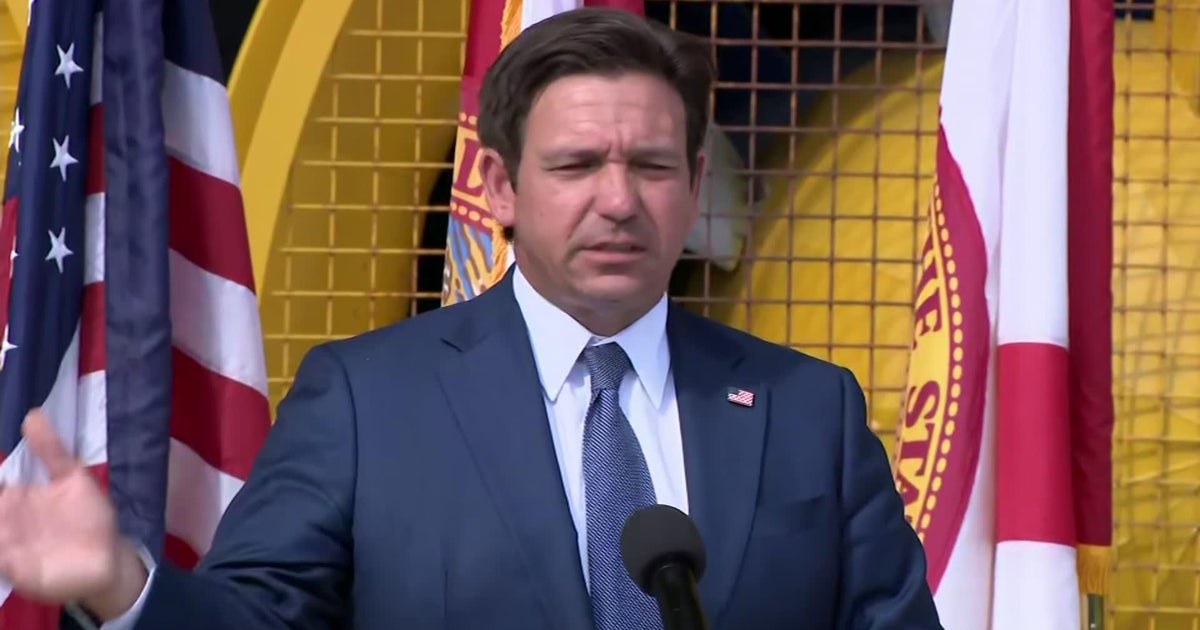Florida Gov. Ron DeSantis on Monday argued Floridians aren’t “clamoring” for a sales tax cut as House Speaker Daniel Perez proposed last week and said they would prefer reducing homeowners’ property taxes.
DeSantis said during an appearance at the industry group Florida Realtors in Orlando that the House sales-tax proposal should be swapped for a one-time tax break for homesteaded property owners. He said that would serve as an “opening salvo” before asking voters in November 2026 to eliminate property taxes or increase the homestead exemption.
“People, for one, are not clamoring for sales tax relief. They’re clamoring for property tax relief,” DeSantis said. “There’s no property tax relief in that (House) proposal. But it also allows (sales tax) relief for foreigners. It allows (sales tax) relief for visitors and part-time residents.”
Perez, R-Miami, on Wednesday proposed permanently cutting the state sales-tax rate from 6 percent to 5.25 percent. He said nearly $5 billion a year in tax savings is possible through reductions in state agency spending.
DeSantis said the projected savings in spending should instead be used to finance an “immediate” tax cut for homesteaded property that he estimated would average about $1,000 per homeowner.
“We need to focus on our Florida residents. And focus on, in this case, Florida homeowners, particularly our homesteaded homeowners, and we need to focus the relief there,” DeSantis said. “I want Canadian tourists and Brazilian tourists subsidizing the state (through sales taxes) and making it so Florida residents pay less taxes. I don’t want to give Canadians a tax cut.”
Perez open to collaboration, Senate urges caution
Perez issued a statement Monday that indicated a willingness to work with DeSantis to resolve the issues.
“I welcome the governor’s proposal and look forward to more conversations on how we deliver meaningful tax relief for every Floridian to help make Florida more affordable, but just as importantly, to shrink the size and excess of government on all levels, that overspend and overregulate to the detriment of the people they represent,” Perez said.
“I am pleased that the governor has embraced the House’s record-breaking spending reductions. There is much work to be done in this area, and we are just getting started. I look forward to a willing partner in the governor to meet these challenges head-on.”
Senate President Ben Albritton, R-Wauchula, called the proposals by DeSantis and Perez “worthy of our thought and consideration.” But Albritton said both need to be studied, as he isn’t comfortable passing a budget that might be balanced for the upcoming 2025-2026 fiscal year but creates shortfalls down the road.
“Cutting taxes now does little good if they have to be raised two years from now to address budget shortfalls,” Albritton said in a prepared statement. “No one wants a repeat of the Great Recession, and we’ve done our best to avoid that by reining in spending, paying down debt and setting aside significant reserves.”
The House sales-tax proposal came two days before the House released a proposed $112.95 billion budget for fiscal year 2025-2026, and the Senate proposed a $117.36 billion spending plan.
Budget talks loom as lawmakers weigh tax options
Lawmakers will negotiate a new state budget and a tax package in the coming weeks, with the legislative session scheduled to end May 2.
Without a state income tax, Florida relies heavily on sales taxes to fund programs such as schools, health care and prisons. While the state has a 6 percent rate, many counties have higher rates through what is known as a “discretionary” sales tax.
Perez released the sales-tax proposal after DeSantis and many lawmakers have called during this year’s legislative session for reducing — or possibly even eliminating —property taxes, which local governments depend upon to cover expenses that include schools, parks, fire-rescue and police.
Critics of such property-tax ideas have said they could force increasing sales taxes to make up the lost revenue.
Several bills have been put forward during this year’s legislative session to put proposed property-tax cuts on the November 2026 ballot, but lawmakers could first direct a study of the potential impact of such a move.
Addressing reporters on the sales-tax proposal last week, Perez said he remained open to asking voters in 2026 to amend the state Constitution on property taxes, but the only question is “how we do that.”
“Once you start to cut property taxes, does that mean that you’re cutting into the K through 12 (education) budget? Does that mean you’re cutting fire? Cutting police? I don’t know the answer to all of that.” Perez said.
“The moment that I have something in front of me to consider, of course we’ll consider that and we’ll put that on the ballot and let the people back at home decide if they want to cut those services. That’s on them. That’s what the whole ballot process is for.”
DeSantis on Monday said state and local governments can maintain their “core functions” by offloading the tax burden on non-Floridians.
DeSantis also said the state has a “-massive surplus” and could tap budget reserves to offset reductions in school property taxes.
The House Ways & Means Committee is expected to discuss the sales-tax cut proposal on Wednesday.
In a budget proposal released Feb. 3, DeSantis called for $2.2 billion in tax cuts that mostly would come through the elimination over two years of a tax that businesses pay on commercial leases, a move long sought by business groups. He’s also called for a return of sales tax “holidays” on school supplies, recreational items, hurricane supplies and for ammunition and firearms.







